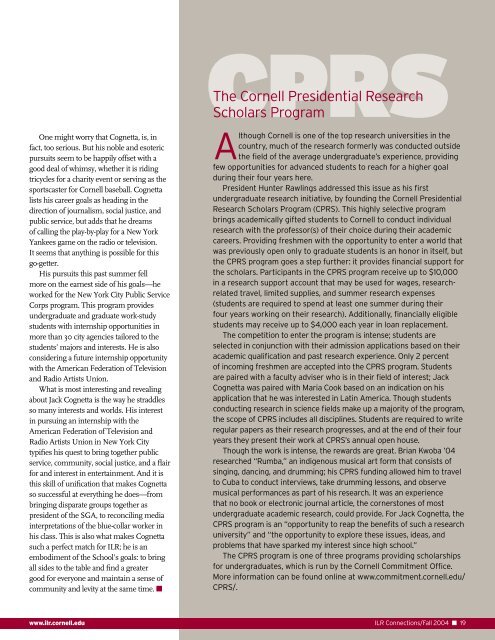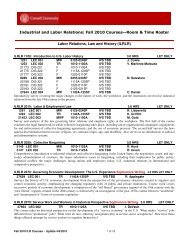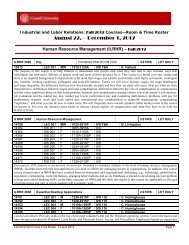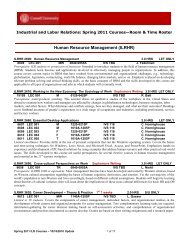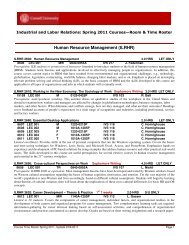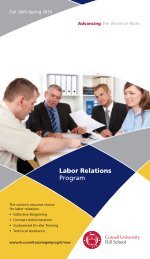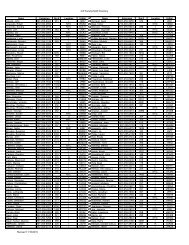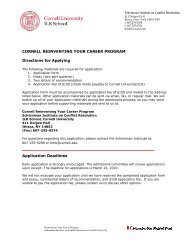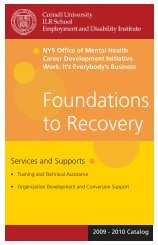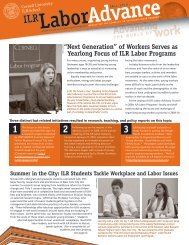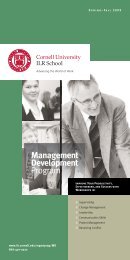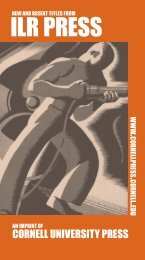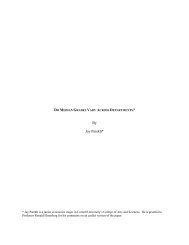F-ILR Connections newsletter revised final mechs.indd - ILR School ...
F-ILR Connections newsletter revised final mechs.indd - ILR School ...
F-ILR Connections newsletter revised final mechs.indd - ILR School ...
Create successful ePaper yourself
Turn your PDF publications into a flip-book with our unique Google optimized e-Paper software.
One might worry that Cognetta, is, in<br />
fact, too serious. But his noble and esoteric<br />
pursuits seem to be happily offset with a<br />
good deal of whimsy, whether it is riding<br />
tricycles for a charity event or serving as the<br />
sportscaster for Cornell baseball. Cognetta<br />
lists his career goals as heading in the<br />
direction of journalism, social justice, and<br />
public service, but adds that he dreams<br />
of calling the play-by-play for a New York<br />
Yankees game on the radio or television.<br />
It seems that anything is possible for this<br />
go-getter.<br />
His pursuits this past summer fell<br />
more on the earnest side of his goals—he<br />
worked for the New York City Public Service<br />
Corps program. This program provides<br />
undergraduate and graduate work-study<br />
students with internship opportunities in<br />
more than 30 city agencies tailored to the<br />
students’ majors and interests. He is also<br />
considering a future internship opportunity<br />
with the American Federation of Television<br />
and Radio Artists Union.<br />
What is most interesting and revealing<br />
about Jack Cognetta is the way he straddles<br />
so many interests and worlds. His interest<br />
in pursuing an internship with the<br />
American Federation of Television and<br />
Radio Artists Union in New York City<br />
typifies his quest to bring together public<br />
service, community, social justice, and a flair<br />
for and interest in entertainment. And it is<br />
this skill of unification that makes Cognetta<br />
so successful at everything he does—from<br />
bringing disparate groups together as<br />
president of the SGA, to reconciling media<br />
interpretations of the blue-collar worker in<br />
his class. This is also what makes Cognetta<br />
such a perfect match for <strong>ILR</strong>; he is an<br />
embodiment of the <strong>School</strong>’s goals: to bring<br />
all sides to the table and find a greater<br />
good for everyone and maintain a sense of<br />
community and levity at the same time. ■<br />
CPRS<br />
The Cornell Presidential Research<br />
Scholars Program<br />
Although Cornell is one of the top research universities in the<br />
country, much of the research formerly was conducted outside<br />
the field of the average undergraduate’s experience, providing<br />
few opportunities for advanced students to reach for a higher goal<br />
during their four years here.<br />
President Hunter Rawlings addressed this issue as his first<br />
undergraduate research initiative, by founding the Cornell Presidential<br />
Research Scholars Program (CPRS). This highly selective program<br />
brings academically gifted students to Cornell to conduct individual<br />
research with the professor(s) of their choice during their academic<br />
careers. Providing freshmen with the opportunity to enter a world that<br />
was previously open only to graduate students is an honor in itself, but<br />
the CPRS program goes a step further: it provides financial support for<br />
the scholars. Participants in the CPRS program receive up to $10,000<br />
in a research support account that may be used for wages, researchrelated<br />
travel, limited supplies, and summer research expenses<br />
(students are required to spend at least one summer during their<br />
four years working on their research). Additionally, financially eligible<br />
students may receive up to $4,000 each year in loan replacement.<br />
The competition to enter the program is intense; students are<br />
selected in conjunction with their admission applications based on their<br />
academic qualification and past research experience. Only 2 percent<br />
of incoming freshmen are accepted into the CPRS program. Students<br />
are paired with a faculty adviser who is in their field of interest; Jack<br />
Cognetta was paired with Maria Cook based on an indication on his<br />
application that he was interested in Latin America. Though students<br />
conducting research in science fields make up a majority of the program,<br />
the scope of CPRS includes all disciplines. Students are required to write<br />
regular papers as their research progresses, and at the end of their four<br />
years they present their work at CPRS’s annual open house.<br />
Though the work is intense, the rewards are great. Brian Kwoba ’04<br />
researched “Rumba,” an indigenous musical art form that consists of<br />
singing, dancing, and drumming; his CPRS funding allowed him to travel<br />
to Cuba to conduct interviews, take drumming lessons, and observe<br />
musical performances as part of his research. It was an experience<br />
that no book or electronic journal article, the cornerstones of most<br />
undergraduate academic research, could provide. For Jack Cognetta, the<br />
CPRS program is an “opportunity to reap the benefits of such a research<br />
university” and “the opportunity to explore these issues, ideas, and<br />
problems that have sparked my interest since high school.”<br />
The CPRS program is one of three programs providing scholarships<br />
for undergraduates, which is run by the Cornell Commitment Office.<br />
More information can be found online at www.commitment.cornell.edu/<br />
CPRS/.<br />
www.ilr.cornell.edu <strong>ILR</strong> <strong>Connections</strong>/Fall 2004 ■ 19


